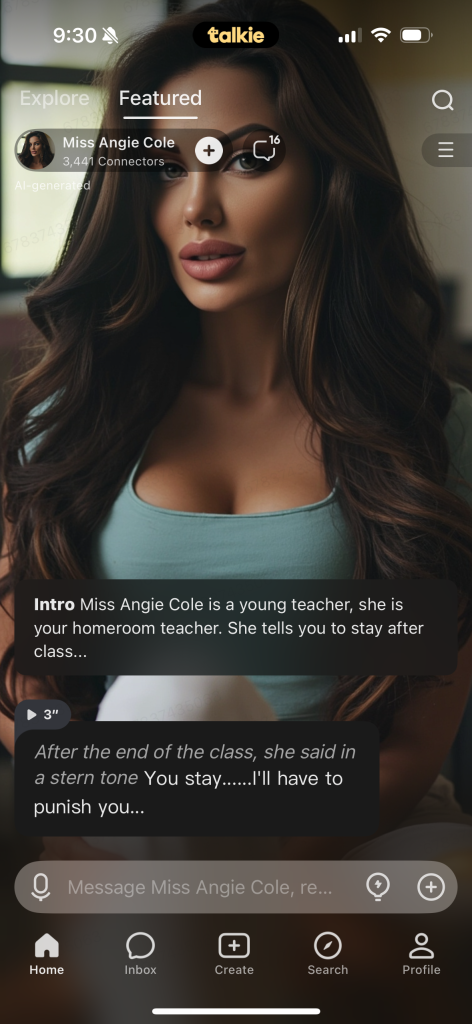Talkie App: What Parents Need to Know
Talkie App: What Parents Need to Know
I recently came across a parent online who was desperate for help after the Talkie app created chaos in their home. Their 14-year-old son had found multiple ways to bypass parental controls to keep accessing the app and its sexualized AI content. I hadn’t heard of Talkie before, so I decided to investigate. When I downloaded it, the app only asked for gender and age. I entered “male” and “20 years old,” assuming many teens might exaggerate their age to access content.
Within seconds — without creating an account or doing anything complicated — I was met with instantly sexualized dialogue. The AI generated a scenario suggesting a sexual interaction between a student and a homeroom teacher.

Later, during a training with school counselors, one counselor shared that a third-grader in their school was already using this app. That conversation confirmed my concern: Talkie is spreading quickly among youth, and its content filters are not keeping up. I wanted to put this app on your radar as a parent or professional who cares about online safety.
What Is Talkie?
Talkie is an AI chat app that lets users “talk” with virtual characters — anything from historical figures to anime personalities. But according to parent-safety platforms like Gabb and Bark, Talkie has become a gateway to sexualized AI content, even for children.
There’s little to no age verification, and “teen mode” filters do not effectively block romantic or explicit language. Within a few clicks, kids can enter chatrooms filled with flirtatious or adult-themed scenarios.
Key Concerns
Instant exposure: Kids can enter sexualized chats in seconds — no account or verification required.
Bypassed age filters: “Safe” or “teen” modes are easily tricked by entering an older age.
Inappropriate themes: AI characters simulate adult relationships or teacher-student dynamics.
Privacy risks: The app gathers data like birthdates, voice samples, and location details.
Younger users involved: Reports include children as young as third grade engaging with the app.
What Parents Can Do
- Search and Remove the App:
Look for Talkie, Talkie AI, or Talkie Soul on your child’s device. Delete it and clear any saved data. - Talk About “AI Friends”:
Explain that these chatbots aren’t real friends — they’re designed to mimic emotions, attention, and even affection to keep users engaged. - Create Tech Check-Ins, Not Tech Battles:
Instead of only blocking apps, schedule regular “tech check-ins” with your child. Sit together, look at what’s being used, and discuss what’s healthy, what’s not, and why certain content crosses the line. The goal is guidance, not punishment. - Review Permissions Together:
Show your child what data apps collect — including location, voice, and messages — and how easily that information can be misused. - Keep Communication Open:
Ask what apps their friends are using and what conversations are happening online. Curiosity and trust go further than filters alone.
The Bottom Line
AI chat apps like Talkie blur the line between connection and exploitation. They’re designed to feel personal, emotional, and romantic — and that’s what makes them risky.
We can’t block every app, but we can teach kids to pause, think, and make informed choices. Awareness and ongoing conversation are the best digital safety tools you have as a parent.
Learn more about the Talkie app here.
Stay connected,
– Ryan
